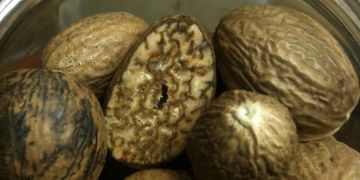Origins of Nutmeg
People use nutmeg as a general name for many trees in the Myristica family. These trees grow mainly in Indonesia, specifically the Banda Islands. Nutmeg as a spice is now known the world over.
The nutmeg tree is unusual in that it is the source of two separate spices, namely nutmeg and mace. Nutmeg is from the seed of the tree, mace is from the aril, which is the reddish seed covering.
Several other commercial products are also produced from the trees, including essential oils, extracted oleoresins, and nutmeg butter.
It takes 7 - 9 years for nutmeg trees to produce the first crop of nutmeg, and it is 20 years before the trees are at their full production.
Health Uses of Nutmeg
Relaxation
When mixed with warm milk, nutmeg can relax the body and help you to fall asleep more easily. This same property is why some people seek nutmeg as an aid to reduce anxiety.
Brain Health
Nutmeg can be taken to stimulate the brain and to ward off stress and lack of energy. Nutmeg ingredient myristicin can also be effective against Alzheimer's and other memory-related conditions.
Pain & Inflammation
The Chinese commonly included nutmeg in medicine for patients who were suffering from pain or inflammation. Nutmeg is currently used for a variety of pain, from general aches to arthritis. Some practitioners use the essential oil for rubbing on joints or other parts of the body that are experiencing pain.
Antibacterial
The antibacterial properties may help relieve inflammation and sores, while it's also useful if you suffer from bad breath for that same reason. General gum and mouth sores or infections may be relieved with nutmeg, which is certainly more pleasant than garlic cloves! Add a bit to your toothpaste for a fresh taste and daily cleanse. Nutmeg essential oil can also be used on a sore tooth. The medical industry recognizes ingredients such as macelignan as effective against strep throat because it works as an antibacterial agent.
Leukemia
This same active ingredient, methanolic, it may also fight against certain leukemia cells.
Appetite & Digestion
For people suffering from a lack of appetite, nutmeg may help. It can also relieve gastrointestinal distress such as bloating by removing excess gas from the body.
Liver & Kidneys
Some people also believe that nutmeg can help two other organs: the liver and kidneys. It's believed by some that nutmeg removes toxins that can build up in both areas, which occurs in both organs. Furthermore, nutmeg can help remove stubborn kidney stones, allowing you to pass them naturally.
Skin Conditions
As an essential oil, nutmeg can be applied to the skin. A lesser-known version of nutmeg products is butter, which can actually be used in place of cocoa butter in cosmetic products. Nutmeg may be mixed with other ingredients to form a paste or cream for topical use to help improve skin conditions. Nutmeg with Orange lentil powder or honey, creates an effective scrub that may relieve blackheads and even reduce marks from acne. Nutmeg essential oil can also be applied to the skin to help relieve skin conditions. It is usually mixed with another oil or cream first to dilute it.
How to Take
Nutmeg is usually taken in powder form. Some recommend no more than a sprinkle added to food and drinks, while others intake 1/4 teaspoon on a daily basis.
Simply adding nutmeg to recipes can increase flavor and have health benefits. Nutmeg may be part of a healthy diet thanks to trace minerals found in this plant: potassium, calcium, iron and manganese. Consider nutmeg in soups or sprinkled on treats such as pumpkin pie or warm milk drinks. Nutmeg may also go well in hot chocolate or on top of hot cereals such as oatmeal.





